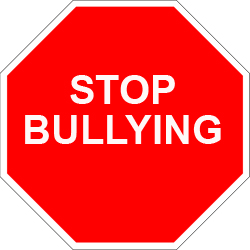October is Bullying Prevention Month and a great time to talk to your kids about what to do if they are being bullied.
Being a child is difficult enough without adding the pain of being bullied to the equation. Bullying is not simply the typical disagreements or conflicts that occur between friends or classmates. It’s bullying if:
- The person is being hurt, harmed or humiliated with words or behavior.
- The behavior is repeated, but it can be a single incident.
- It is intentional.
- The person being hurt has a hard time defending themselves.
- Those who are doing it have more power which can include things such as being older or physically bigger or stronger, having more social status or when a group “gangs up” on someone.
Bullying includes actions such as making threats, spreading rumors, attacking someone physically or verbally and purposefully excluding someone from a group.
Most reported instances happen in the school building but a significant percentage also happens in places like on the playground or the bus. It can also happen traveling to or from school, in the youth’s neighborhood or online.
There are educators that say they are hearing some parents and children cry “bully” as if they are crying wolf. There have been incidents of a parent or child using the word bully to label any kid they do not like. The concerns of overreaction are real and can have a negative impact on kids who were not guilty.
Although the following incidents are distressing, they are not considered bullying:
- Single episodes of social rejection or dislike
- Single episode acts of nastiness or spite
- Random acts of aggression or intimidation
- Mutual arguments, disagreements or fights
These are not examples of bullying unless someone is deliberately and repeatedly doing them.
To help prevent bullying, parents and other adults can:
- Help kids understand bullying by talking about what it is and how to stand up to it safely.
- Tell kids that it is unacceptable.
- Make sure kids know how to get help.
- Talk to children honestly and openly.
- Ask questions about school and friends.
- Be sensitive to their concerns.
- Encourage them to participate in special activities which helps boost confidence and help kids make friends.
- Be a good example of how to treat others with kindness and respect.
Teach children to:
- Treat everyone with respect
- Never be mean to others.
- Think before speaking or taking action that could hurt someone.
- Talk to an adult to learn ways to be nice to others.
- Remember that everyone is different. No one is better or worse, just different.
- If they think they have bullied someone in the past, encourage them to apologize.
If children are bullied, teach them to:
- Walk away if standing up to the bully seems too difficult or unsafe.
- Don’t fight back.
- Find an adult to stop the bullying.
To prevent future bullying, teach children to:
- Talk to a trusted adult.
- Explain that telling someone how they feel can help them feel less alone.
- Tell them to stay away from places where bullying happens if possible.
Teach children to stand up for others
- When they see someone being bullied, they should talk to a parent, teacher or another trusted adult.
- Be kind to the kid being bullied. Include them in activities, talk to them, sit with them at lunch or just hang out with them so they know that they are not alone.
Bullying can impact kids’ physical and mental health. It can cause physical harm and affect kids’ sense of well-being and self-esteem. Actions such as repeatedly laughing at someone, calling them names, excluding them socially and teasing are emotional bullying.
Sources: pacerteensagainstbullying.org/bullying-defined/, Stopbullying.gov, ncab.org.au/bullying-advice/bullying-for-parents


